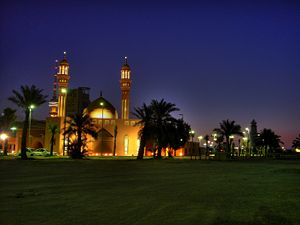
Religion in Kuwait
Encyclopedia

Religion
Religion is a collection of cultural systems, belief systems, and worldviews that establishes symbols that relate humanity to spirituality and, sometimes, to moral values. Many religions have narratives, symbols, traditions and sacred histories that are intended to give meaning to life or to...
in Kuwait
Kuwait
The State of Kuwait is a sovereign Arab state situated in the north-east of the Arabian Peninsula in Western Asia. It is bordered by Saudi Arabia to the south at Khafji, and Iraq to the north at Basra. It lies on the north-western shore of the Persian Gulf. The name Kuwait is derived from the...
is predominantly Islamic with 85% of the population being Muslim (Sunni 70%, Shi'a 30%) and the remaining 15% being Christian, Hindu and Parsi. While there are small numbers of Kuwaiti Christians
Christianity
Christianity is a monotheistic religion based on the life and teachings of Jesus as presented in canonical gospels and other New Testament writings...
, there is no significant Jewish community present. Most foreigners are Muslim, Hindus or Buddhists.
Islam
85% of Kuwait's population is Muslim, of which 70% is Sunni and 30% is Shi'a. Some other minor Muslim sects do exist in Kuwait's society, but in very small or rare numbers. The Grand Mosque of Kuwait serves the needs of many of the Sunni Muslims and activities are also conducted for Muslim expatriates by foreign born scholars at the Grand Mosque, such as those of Imam Mohammed Daniel who conducts lectures in EnglishThe majority of Kuwaiti nationals are Sunnis Muslims; the minority are Shi'a. Shia are a diverse group. Some are Arab, many the descendants of immigrants from Ash Sharqiyah (Eastern Province) in Saudi Arabia or from Bahrain.Families who moved from the Arabian side of the Persian Gulf to Iran, stayed awhile, and then returned. Others are of Iranian origin, who often speak Persian
Persian language
Persian is an Iranian language within the Indo-Iranian branch of the Indo-European languages. It is primarily spoken in Iran, Afghanistan, Tajikistan and countries which historically came under Persian influence...
as well as Arabic at home and sometimes maintain business or family ties with Iranians across the Persian Gulf. After the Iranian Revolution of 1979 and the subsequent Iran-Iraq War of 1980-88, this Shia community experienced a renewed sense of sectarian identification. The identification resulted from sympathy with their revolutionary coreligionists in Iran and from increasing government and social discrimination. During the 1980s, the tension between Sunnis and Shia, which had erupted occasionally in the past, became somewhat sharper.
Christianity
Christianity is a minority religion in Kuwait. There are 140,000 Catholics in Kuwait (about 2.86% of the population). There are now about 50,000 Protestants in Kuwait (2.14% of the population). The Anglican Church has about 115 members. The National Evangelical Church has about 15000 members. The Greek Orthodox Church has about 3500 members, the Armenian Orthodox Church has about 4000 members. The Coptic Orthodox Church has about 60,000 members. The vast majority of Christians in Kuwait are foreigners. The Seventh-day Adventists are among the unrecognized Christian groups. The majority of Christians are foreign expats. However, there are approximately 200 Christian citizens, most of whom belong to 12 large families. A 1980 law prohibits the naturalization of non-Muslims; however, citizens who were Christians before 1980 are allowed to transmit their citizenship to their descendants, though not their spouses.Judaism
The history of the Jews in Kuwait is connected to the history of the Jews in Iraq. In the 1920s, there was an exodus of Jews out of Kuwait to Baghdad because of the Jewish-friendly King Faisal the First who rose to power there. These were largely "Babylonian Jews" who have existed in the region for centuries, and have helped greatly in the economic development of Kuwait, Baghdad and the surrounding regions throughout the 19th-century. Today, there are no Jewish Kuwaiti citizens.The Kuwaiti government is more forgiving of Christians and Jews than most other Arab and Muslim nations. In the new city of Madinat al-Hareer, a Jewish synagogue will be included in the landmark skyscraper together with a mosque and a Christian church.

